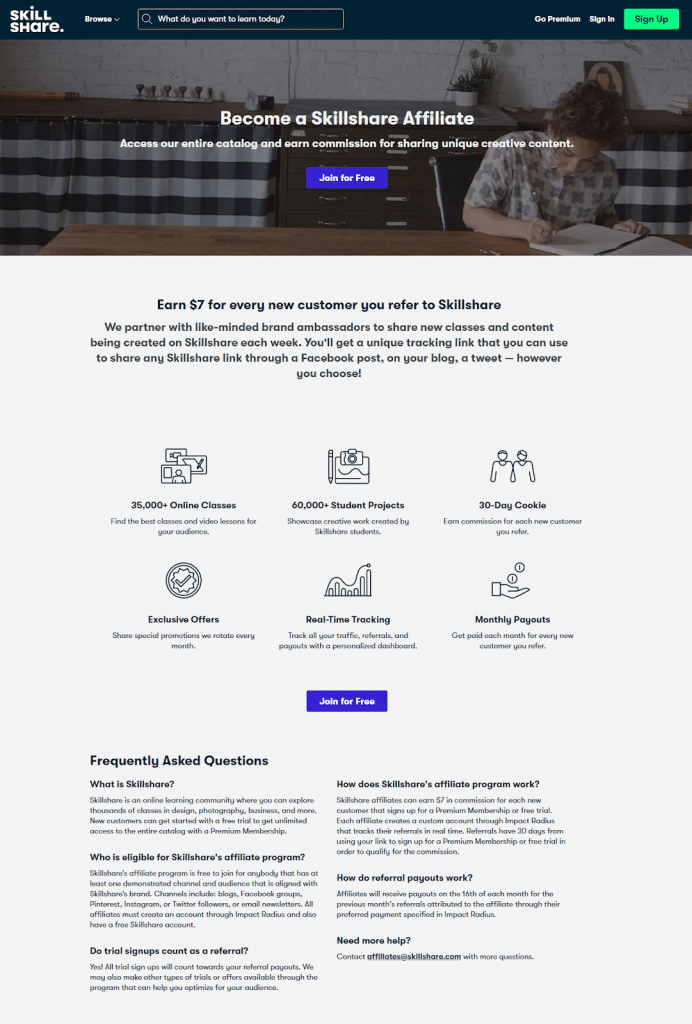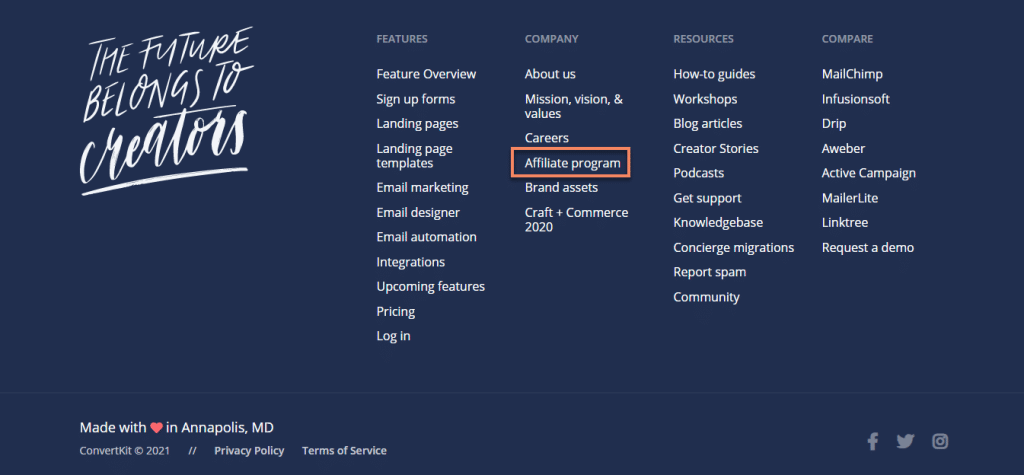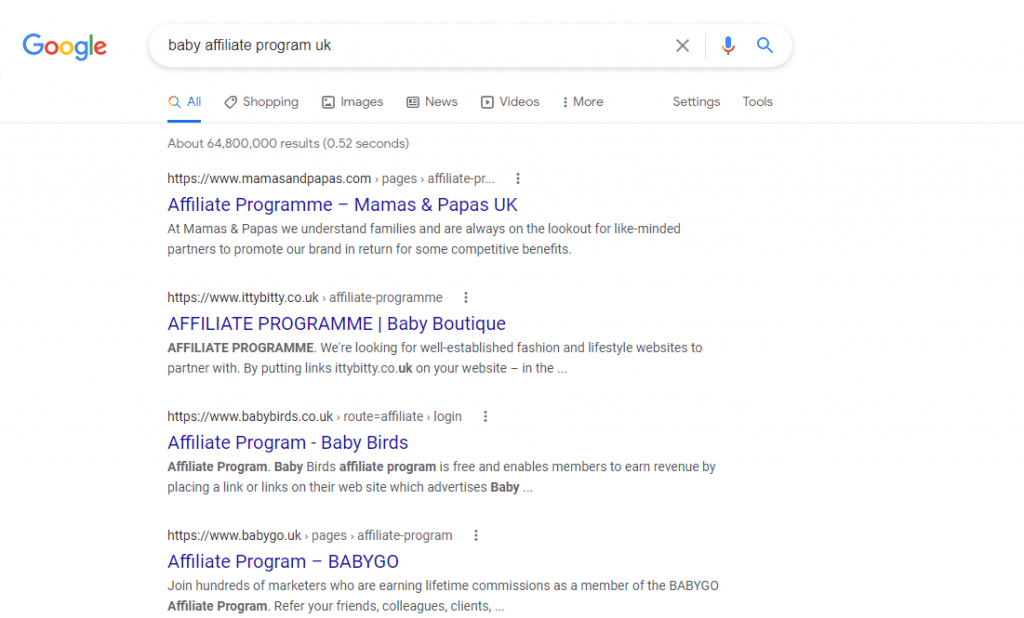You’ve bought the right affiliate software. And you’ve taken the time to design an attractive affiliate marketing program to draw in new customers. But if you don’t promote your affiliate program on the right channels, all your launch efforts will go to waste.
After all, you’ll need to recruit affiliates – bloggers, social media personalities, niche experts, or customers who place your affiliate links on their own channels – for successful affiliate marketing.
Promoting your affiliate program ensures these potential affiliates are able to find your program, and sign on to help generate new leads and sales.
How to promote your affiliate program? We go over 11 proven affiliate marketing strategies you can apply right now, whether you’re an ecommerce brand, a B2B SaaS, or any other type of online business.
1. Build a well-designed affiliate program page
We have to start this list with your affiliate program page, as it’s the hub of your entire affiliate program (and your promotional efforts).
The affiliate program page is where your potential affiliates learn all about your program and what’s in it for them.
All your promotion efforts will be focused on getting prospective affiliates to this page. Then, when they’re interested enough to learn more, it’s the affiliate program page that will sell the program!
What should you include on your affiliate program landing page?
- An enticing call-to-action (the bold header text that draws people in and “sells” your program in a few brief words)
- The affiliate commission rate you offer
- Is the commission a flat rate or a percentage of every sale?
- Are high commission rates or bonuses offered for top affiliates?
- An explanation of how your program works
- A compelling hero image to catch the potential affiliate’s eye
- Clear affiliate program terms and conditions, so prospective affiliates know what to expect
- Include the requirements for an affiliate to earn commission, how long affiliate tracking cookies last, whether the first or last affiliate link click earns a commission, what affiliates can and can’t do, and how affiliates will be paid.
- An embedded affiliate application form , or a link to your affiliate program application

Skillshare’s stellar example of an affiliate program landing page.
Next, let’s dive into the ways to promote your program and drive potential affiliates to this all-important page.
2. Include the program in other places on your website
When prospective affiliates check to see if you have a program, they usually check your website’s top and bottom menus. It’s best to include a link to your affiliate program page in both of these menus.

ConvertKit promotes their affiliate program in their bottom menu.
But menus are just one possible way to promote your affiliate program on your website.
Why not promote your affiliate program on pages that get your highest traffic? Or by placing a compelling hero image on your homepage? You could also mention the program in your top blog posts. The possibilities are nearly endless!
3. Mention it in email marketing and newsletters
Promoting your affiliate program within emails directly reaches your existing customers when it matters most.Here are some examples:
- You could invite your top customers to join your affiliate program with a personalized email. Thank them for being such a great customer, highlight how they’ve helped your business, then explain the win-win structure of your affiliate program (they earn passive income and you gain more exposure).
- Or you could let all of your email list subscribers know you have an affiliate program with a dedicated promotional email. (Mentioning your commission rate is a good way to pique your customer’s interest.)
- Promote your affiliate program in transactional or thank-you emails, which are sent at times when customers are most engaged with your brand.
- Include a section about your affiliate program in your regular email newsletter.
- Your email signature is in every message, so why not use it to quickly promote your program?
Whichever way you choose to promote your affiliate program via email, be sure to include a direct link to your affiliate program landing page.
4. Promote on social media channels
Social media is where your audience goes for the inside scoop. So be sure to promote your affiliate program on the social media platforms your audience frequents most.
Create engaging posts that directly link to your affiliate program. And make sure to vary the wording and imagery of your posts to really catch the attention of any potential affiliates.
Just like your email signature, your social media bio is great underrated place to add a link to your affiliate program. Announce “We have an affiliate program!” and drop in that link.
[su_icon_text color=”#474747″ icon=”icon: lightbulb-o” icon_color=”#0088cc” url=”https://referralrock.com/” target=”self”]Videos are a particularly effective way to leverage social media – video content really grabs attention. Why not create an engaging YouTube video about your affiliate program and cross-promote it on other social platforms? Or, you could go live on Facebook to promote your program, just like Kajabi did for their launch.[/su_icon_text]

5. Use strategic SEO (search engine optimization)
Your prime potential affiliates are probably already searching for affiliate programs to join. Make sure they can easily find your affiliate landing page by optimizing it for popular niche and industry keywords, adding “affiliate program” to the end of the keyword. (For example, “baby affiliate program” or “luggage affiliate program.”)

6. Engage in paid ads (PPC ads)
Paying for Google Adwords based on common search terms is another effective way to get in front of potential affiliates. The same goes for Facebook ads targeting people who fall into your ideal demographics and have an audience or peer group that matches your own.
Highlighting your affiliate commission in these ads is particularly effective, as long as your commissions are competitive.
7. Join affiliate forums and groups
Affiliate forums and social media groups are dedicated locations for affiliates to trade tips and seek out new opportunities. Experienced affiliate marketers frequent these sites to find new products in their niche that they can promote.
Consider posting about your own affiliate program in a forum or group (following any guidelines, of course), and watch the affiliates come to you.
It may be best to build a presence and share your expertise before you promote your affiliate program, though. This way, you’ll foster trust among the affiliates in the group, making them even more likely to participate in your program.
Affilorama and Affiliate Fix are two examples of active affiliate marketing forums.
8. Employ direct outreach
What’s the most effective way to promote your affiliate program and find quality affiliates?
Usually, it’s by directly reaching out to handpicked affiliates – bloggers, social media personalities, niche influencers, industry experts, and other quality content creators who share an audience with yours.
Read our other post on how to find dedicated affiliates.
Identify your best affiliate candidates and personally reach out to them via their About or Contact page, or send a direct message on social media.
Don’t be generic – personalization is key here, especially since you’ve handpicked these possible affiliates with so much care. Make a sincere connection with them, recognize their previous work, and show them the benefits of being your affiliate.
First, offer them a chance to try your product. Then, if it’s clear they like what they’ve tried, invite them to become your affiliates.
9. Connect in industry forums and social media groups
Industry-related forums and social media groups (e.g., Facebook Groups, LinkedIn Groups) are great places to stay connected with trends and conversations in your niche.
They also provide an awesome way to find experts who would be willing to share your products or services. With forum participants already familiar with your niche and active in related discussions, several of them should be suitable candidates for your affiliate program.
But don’t spam the forum or group with ads for your program. Instead, get to know the people you think would be good affiliates. Answer their questions, help solve their problems, and show your expertise.
If your product or service is a prime solution to someone’s problem, even better – they’ll likely be game to try your brand, and if they benefit from what you offer, they’ll be glad to promote it.
After you’ve built a presence within the forum or group and a relationship with the relevant experts, personally reach out with a private message to let them know about your affiliate program. Share all relevant information and the specifics of what’s in it for them.
10. Ask partner or related brands
Have you formed a channel partnership, affinity marketing partnership, or any relationship with another brand?
You’re already helping each other reach shared goals you couldn’t reach on your own. Why not ask if your partner would promote your affiliate program? If they also have an affiliate program, you can offer to promote their program in a fair exchange.
If you don’t have one of these partnerships yet, you can still search for relevant, non-competing brands that occupy your niche or share your audience. Reach out to see if they’d be open to promoting your affiliate program in a marketing partnership.
11. List your program in affiliate directories
Affiliate directories are another place where seasoned affiliates frequent to find new opportunities to earn commissions. Essentially, these directories are lists of affiliate programs by niche or industry. They’re much easier to search through and a somewhat more direct way to promote your affiliate program, compared to forums and social media groups.
Oftentimes, your listing will have to be approved first. You also won’t have an opportunity to personalize pitches like you would with other promotion methods. If you’re looking into an affiliate directory listing, our advice is to balance them out with other more personal promotions.
AffiliatesDirectory and AffiliateGuide are some examples of affiliate directories.
Affiliate directories vs. affiliate networks
Affiliate directories are different from affiliate networks because directories promote you for free once you’re approved. In contrast, using affiliate networks comes at a cost.
Even though affiliate networks promote your affiliate program to a different audience, they charge hefty fees on top of the commission you pay affiliates – often up to 30% of the commissions you already pay.
Using an affiliate network also entails sacrificing the freedom to create and manage your own program. Plus, if you use an existing network, you won’t have full control over the affiliate data you want to track.
In a nutshell, affiliate networks aren’t worth it, especially with all the less expensive ways to promote an affiliate program.
Use affiliate software to assemble your own program instead, and keep full control of your data. Then, use some – or all – of the 11 promotional methods we’ve shared in this article.
Wrapping up: Remember to screen affiliates before you accept them!
Regardless of how you promote your affiliate program, you can’t and shouldn’t accept every interested affiliate who fills out an application. Rather, carefully screen all candidates to make sure they’re reputable and a good fit for your business, before you sign them on as new affiliates.
While affiliate program promotions effectively widen your net, you still want to be selective in approving the best affiliates for your program.
Use personalized and strategic promotions to find high-quality affiliates, and then adequately support them in bringing you new leads and customers.




